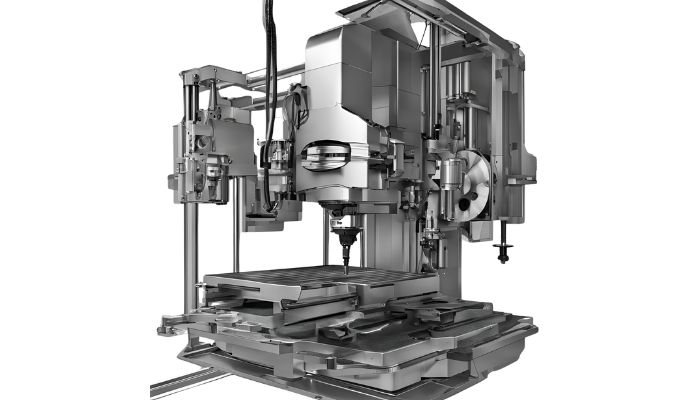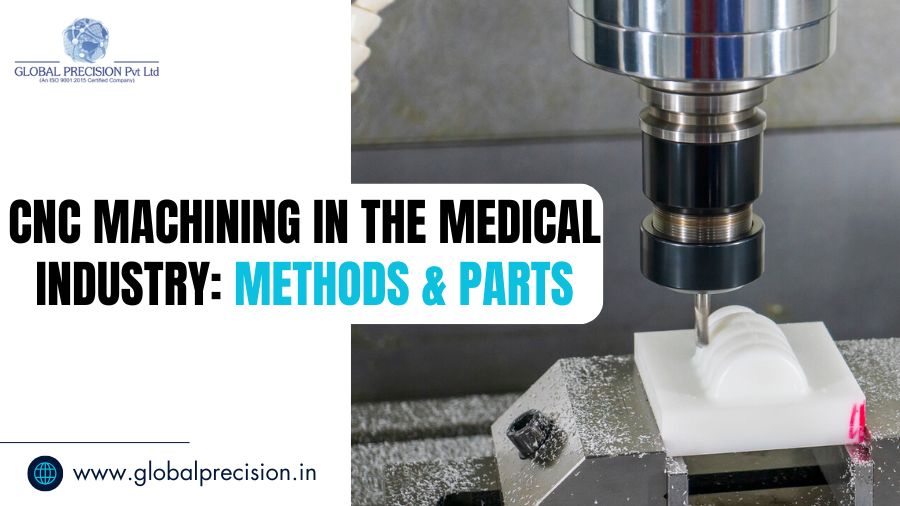Safety and accuracy are non-negotiable in the constantly changing healthcare industry. Because it makes it possible to produce precise, high-quality, and customized medical components, CNC machining has emerged as a major force in the medical sector.
From delicate surgical instruments to life-saving implants, CNC machines provide reliable results with little error. Medical parts are made to precise specifications due to the highly automated and computer-controlled process.
CNC machining is becoming more and more important as the need for patient-specific solutions and sophisticated medical technologies increases. Many CNC Machined Components Manufacturers today concentrate on the medical industry in order to satisfy its comprehensive standards and particular needs.
Through this comprehensive blog, let’s understand in detail what role CNC machining plays in the medical industry and what techniques or methods are used to develop precise products.
Why is CNC Machining Important in the Medical Industry?

In the medical sector, CNC milling components are adequately used to develop surgical products that enhance the overall treatment efficiency of patients. Apart from this, here is a complete overview of some of the significant benefits of CNC machining in the medical field:
1. Unmatched Precision
Medical equipment requires intricate actions to be followed. Thus, precision at the micrometer level is made possible by CNC machining, which is crucial for creating medical parts like implants and surgical tools. Such accuracy and precision in surgical parts further guarantee long-term dependability, functionality, and precise fit in life-critical medical devices.
2. Customization Capabilities
Custom implants and prosthetics can be made by CNC machines that are programmed to fit a person’s body type. Particularly in orthopedic and dental procedures, this improves comfort and performance.
3. Regulatory Compliance
Strict regulatory requirements must be met by medical components. Consistent quality and traceability offered by CNC machining assist a precision parts manufacturer in adhering to international medical standards such as the FDA and ISO.
4. Fast Prototyping and Production
Rapid prototyping, made possible by CNC machining, enables producers to create, test, and improve new medical devices more rapidly in no time. Time-to-market and innovation in healthcare technologies are accelerated as a result of such efficient working.
5. Wide Range of Materials
The CNC process supports biocompatible materials like titanium, stainless steel, and PEEK. These materials are essential for producing CNC milling components that are safe for use inside the human body.
Machining Techniques and Materials Used in Medical Devices
Specialized CNC methods and materials are used to meet the most stringent requirements of medical manufacturing. Companies that manufacture precision parts ensure that every part has passed the tests of safety, strength, and biocompatibility so that medical professionals can experience comfort using all the equipment. Here are some of the key methods used to develop medical devices:
- Multi-Axis CNC Machining: The 5-axis machines, used by CNC Machined Components Manufacturers, are the ones responsible for the generation of complex shapes in just one setup. This method, which is ideal for spinal implants and joint parts, guarantees high precision from different angles.
- Swiss CNC Machining: This is the best method for manufacturing small, cylindrical parts such as screws and catheter tips. The sliding headstock configuration of this machine allows for the production of tiny yet detailed components that can have very close tolerances.
- Milling and Turning: Milling with CNC is the process that makes slots and flat surfaces on the parts, like bone plates. Turning is applied to make round parts like connectors and bone screws while maintaining excellent accuracy.
- Electrical Discharge Machining (EDM): EDM is perfect for cutting extremely hard metals and getting intricate details, such as sharp corners and small holes, in parts like vena cava filters.
- Laser Machining: This technology has been employed in the engraving and drilling of small, fragile items, including surgical tools and marker implants. The operation is done without exerting physical pressure, thus minimizing the likelihood of damage.
Applications of CNC Machining in the Medical Industry
Here are some of the key medical equipment that are designed with the help of CNC machining by precision parts manufacturer:
- Personalized Implants and Prosthetics: Using patient-specific information, CNC machining produces customized implants, including knee, hip, cranial, and dental parts. Compared to mass-produced alternatives, these fit and perform better.
- Minimally Invasive Surgical Instruments: CNC machining creates intricately detailed tools such as graspers, forceps, and endoscopic equipment. With the use of these tools, surgeons can operate with fewer incisions and quicker recovery times.
- Bioprinting Scaffolds: Molds and nozzles used in bioprinting are made with the support of CNC milling components. These allow scientists to build 3D tissue scaffolds that support cell growth for organ and tissue regeneration.
- Advanced Drug Delivery Systems: CNC processes are used in the production of microfluidic devices and implantable pumps. With fewer adverse effects and better treatment results, these systems precisely and directly administer medication.
- Microfluidics and Lab-on-a-Chip Devices: CNC machining plays a vital role in producing compact diagnostic tools for testing fluids in small volumes. These devices are critical in labs for testing and drug research. This is why they are made with the utmost precision by CNC Machined Components Manufacturers.
The Future of CNC Machining in Medical Manufacturing
With the medical industry growing, CNC machining is becoming more advanced, and it will continue to be a part of the evolution of technology. For production that is not only smarter but also faster, there will be more future-oriented AI, robot, and 3D printer integration.
Precision will not only continue to improve, but it will also allow the creation of implants with ultra-customization and nano-scale tools. The role of a precision parts manufacturer in the production of wearable health devices and micro-implants will also be more significant.
With growing demand for personalized care, CNC machining ensures healthcare providers can deliver better, faster, and more effective treatments worldwide.
Conclusion
CNC machining technology has changed the medical field completely by letting manufacturers make parts that are quite reliable and of very good quality with exceptional precision. The technology helps to make implants, surgical instruments, and diagnostic devices quickly and allows for the application of cutting-edge techniques that are both versatile and fast. As medical science gets more innovative, the demand for trustworthy CNC Machined Components Manufacturers gets stronger.
Are you looking for a reliable partner to meet your medical CNC machining requirements? Global Precision Pvt Ltd is among the best CNC machining experts with a significant presence in the industry. We deliver quality, precision, and compliance throughout the process, whether it involves high-volume production or small batch prototyping.
Being one of India’s leading CNC machining companies, we make custom medical parts that comply with international standards. Your products will be trustworthy and market-ready due to our cutting-edge equipment, experienced technicians, and strict quality control processes. Get in touch with us now and find out how we can be of help to your next healthcare-oriented project.
You might also want to read this: Top 5 Reasons To Choose Local CNC Machining in Delhi NCR

